The 9 Best Protein Powders and Shakes for Kids of 2023, According to a Dietitian
Dotdash Meredith and Yahoo Inc. may earn commission or revenue on some items through the links below.
These protein powders & shakes can help little ones get the nutrients they need
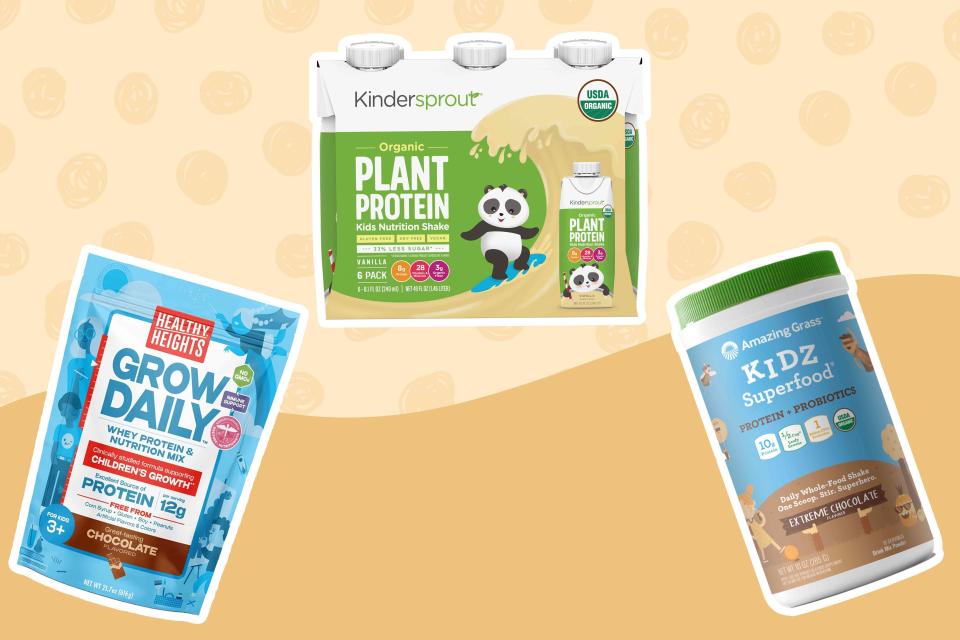
Verywell Family / Reese Herrington
Fact checked by Rich Scherr
Children’s food preferences and eating behaviors can change often. For parents and caregivers, it can be stressful when your child isn’t eating a variety of foods. You may have thought your child would eat a colorful, balanced diet (and maybe they used to), and now you’re amazed that a beige primarily-cracker-based diet manages to keep them on their growth curve.
Kids getting enough protein can be a common concern, especially among parents of picky eaters. This may lead many parents to wonder if their child would benefit from drinking protein powders and shakes. Because they’re so readily available, protein supplements may seem safe and reasonable for children, yet studies show that the majority of children meet or even exceed their estimated daily protein needs through diet alone.
Therefore most children may not need protein supplements on top of their regular diet, and getting too many protein supplements could lead to a child getting too much protein, vitamins, or minerals. However, if your child is not able to meet their protein requirements through diet alone–whether due to diet restrictions, increased needs, eating challenges, or a medical complication–protein powders and shakes can be a good choice.
Our pediatric dietitian interviewed experts and looked at protein amounts, other ingredients, and taste to come up with our top recommendations for the best protein powders and shakes for kids.
Our team of registered dietitians reviews and evaluates every single supplement we recommend according to our dietary supplement methodology. From there, a registered dietitian on our Expert Review Board reviews each article for scientific accuracy. Always speak with a healthcare professional before adding a supplement to your routine, to ensure that the supplement is appropriate for your individual needs and which dosage to take.
Best Overall: Else Nutrition Kids Organic complete nutrition Shake Powder

Pros
Clean Label Project Purity certified
Suitable for plant-based diets
Fortified with over 20 essential vitamins and minerals
Cons
Requires 5-6 scoops of powder for 4 ounces of liquid
Not safe for tree-nut allergies
Else Plant Protein Nutritional Shake for Kids is our top choice due to its quality ingredients, nutritional profile, and kid-friendly flavor options. It’s a great option for picky eaters who might benefit from a well-rounded, nutritional supplement.
Not only does each serving provide five grams of protein, Else has more fat and calories than most of the other protein supplements for kids which can be helpful for kids who may need help gaining weight. With over 20 essential vitamins and minerals, it’s a nutrition-packed addition to help boost a child’s diet that may be lacking in variety. Because this product is fortified with vitamins and minerals, be sure that your child is not exceeding the recommended intakes for each vitamin and mineral, especially if they are taking additional supplements like a multivitamin.
With four flavors–vanilla, chocolate, banana chia, mango chia–there’s something for every palate. You can serve it as a shake on its own or mix it in with other foods in smoothies, oatmeal, or other recipes.
Else supplements are certified organic and Clean Label Project Purity certified, so you can feel good knowing your child’s drink has safe levels of heavy metals and industrial and environmental toxins and contaminants.
It does have a larger serving size—five to six scoops—and only 10 servings per container. While a good choice for vegan or vegetarian diets, it is not safe for tree nut allergies.
Price at time of publication: $23 ($2.30 per serving)
Key Specs:
Form: plant-based whole food | Type: powdered nutrition supplement | Protein per serving: 5g | Third-Party Certified: Yes | Servings Per Container: 10
Best Whey Protein: Nurished Mighty Chocolate Milk
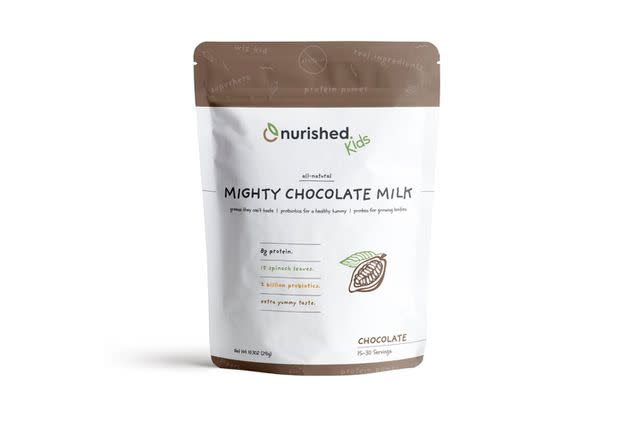
Pros
No added sugar
Whey protein is efficiently absorbed
Good choice for those looking only for a protein boost
Cons
Contains sugar alcohols
Designed to be a healthier alternative to chocolate milk, Nurished Mighty Chocolate Milk is a great whey protein-based, powdered protein option. Whey protein is a highly bioavailable, complete source of protein with an optimal amino acid profile. However, as a whey-based supplement, note it is not a good choice for those with dairy allergies or intolerances.
This product contains small amounts of calcium, iron and potassium, but is mostly a protein supplement, making it a good option for kids that eat a diverse diet or take other vitamin/mineral supplements but may be lacking in protein specifically.
Each serving for kids 4 years and older provides eight grams of protein from whey protein concentrate along with two billion CFU probiotics, and has an organic spinach leaf blend mixed with the protein. You can easily halve the dose for kids 2-3 years old. While some may appreciate the added probiotic, note some children may not benefit from the added probiotic if they have underlying gut issues or take other probiotic supplements.
According to the manufacturer, Nurished works best when shaken or frothed with a milk or milk alternative, so it’s not the most convenient option. But it can also be added directly to smoothies or oatmeal for a chocolatey nutrition boost. Some may appreciate this choice is sugar free, but note it does have sugar alcohol erythritol and stevia added which may not suit all taste preferences.
Price at time of publication: $22 ($1.47 per serving)
Key Specs:
Form: Whey protein concentrate | Type: protein powder | Protein per serving: 4-8g (depending on age and desired dose) | Third-Party Certified: No | Servings Per Container: 16-32 (For 2-3 year olds there are 32 servings. For ages 4+ there are 16 servings in a pouch.)
Best Full Nutrition: Kate Farms Pediatric Standard Nutritional Supplement Drinks
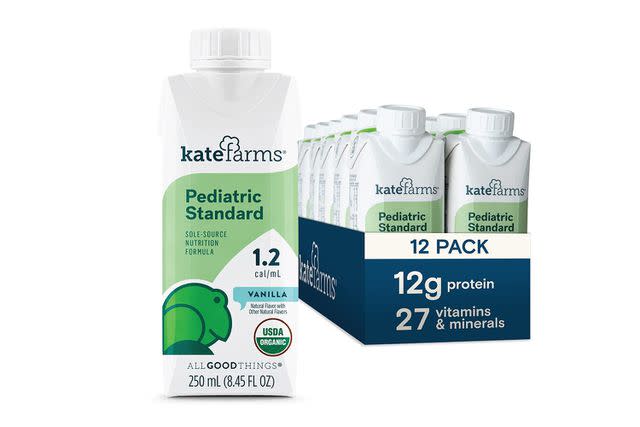
Pros
Designed for children needing medical nutrition support
Complete nutrition shake with essential vitamins and minerals
Insurance coverage available with prescription
Free of common food allergens
Cons
Not designed for children needing just a protein boost
If your child needs a larger nutrition boost and may have an underlying health condition, Kate Farms Pediatric Standard 1.2 formula is a good choice. It is a complete nutrition protein shake, fortified with all essential vitamins and minerals. It is higher in calories, protein, and macronutrients compared to other shakes, as it is designed specifically for children with clinically diagnosed, low nutrition intake. One 8.45 fluid ounce carton contains 300 calories, 12 grams of protein, 36 grams of carbohydrates, and 12 grams of fat. You can also adjust the serving size based on your child’s nutritional needs.
Because this shake is fortified with micronutrients, be sure that your child is not exceeding the recommended intakes for each vitamin and mineral from other sources (like additional supplements, including a multivitamin), unless a healthcare professional has advised otherwise to correct a diagnosed deficiency.
We like that this product is USDA Organic and is also free of common food allergens, including milk, eggs, fish, shellfish, tree nuts, peanuts, wheat or soybeans. The protein base is pea protein, a complete protein with all essential amino acids, suitable for vegan diets. It is also free of artificial sweeteners, and contains a plant-based phytonutrient blend with antioxidants.
Kate Farms formulas are eligible for insurance coverage with a prescription from a healthcare professional. They also offer a monthly subscription service that makes replenishing your supply convenient and also brings down the cost of the product. This product should be used under a healthcare professional, as they can fill out a medical necessity form for this product.
Price at time of publication: $51 for 12 pack ($4.25 per serving)
Key Specs:
Form: plant-based protein | Type: ready made protein shake | Protein per serving: 12g | Third-Party Certified: No | Servings Per Container: 12
Related:The 7 Best Children’s Vitamins of 2023, According to a Dietitian
Best Budget Shake: KinderSprout Organic Plant-Based Protein Nutrition Shake
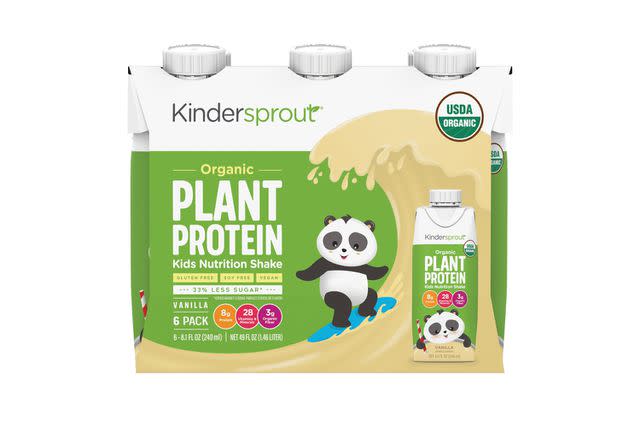
Pros
Free of common food allergens
Contains organic fruit and vegetable blend
Fortified with vitamins and minerals
USDA Organic
Cons
Contains 9 grams of added sugar
If a budget-friendly and organic protein shake is important to you, we recommend KinderSprout Plant-Based Protein Nutrition Shake. We like that it is USDA Organic and has no artificial colors or sweeteners. It provides eight grams of plant-based protein from organic brown rice and peas which gives it a complete amino acid profile.
We love that KinderSprout’s drink also provides three grams of fiber and 28 essential vitamins and minerals per serving, as it is made with an organic fruit and vegetable blend. This makes KinderSprout a good choice for kids that need a protein boost as well as other nutrients in their diet.
Available in vanilla and chocolate flavors, KinderSprout is vegan and free of GMOs and also doesn’t contain dairy, nuts, soy, yeast, eggs, wheat, shellfish, or gluten making it a good choice for a range of allergies and dietary restrictions.
Price at time of publication: $11 for 6 ($1.83 per serving)
Key Specs:
Form: plant-based protein | Type: ready made protein shake | Protein per serving: 8g | Third-Party Certified: Yes | Servings Per Container: 6
Best Single-Ingredient: PB&Me Organic Powdered Peanut Butter, No Sugar Added

Pros
Third-party tested
Contains just peanuts
USDA Organic
Cons
Not suitable for peanut allergies
Made with just one ingredient—peanuts—PB&Me Natural Powdered Peanut Butter is a simple, tasty, and budget-friendly option for kids needing extra protein in their diets, but not much else. It’s low in fat and isn’t fortified with extra nutrients, so if protein is your sole focus, this is a great powder option.
PB&Me Natural Powdered Peanut Butter is also a great option for kids who don’t like the taste of protein shakes. It works well incorporated into baked goods and smoothies, though you can also mix it with water to make a peanut butter spread.
Notably, each two tablespoon serving provides 45 calories, six grams of protein, two grams of fiber, and 2% Daily Value of iron.
Though you can’t pack it for lunch if your child attends a nut-free school, PB&Me is suitable for gluten-free, dairy free, vegan, and organic dietary needs. The added bonus is that it’s also third-party tested for purity and potency (including heavy metal testing), so you can trust it’s a safe option for your peanut-loving child.
Price at time of publication: $15 ($0.88 per serving)
Key Specs:
Form: powder | Type: peanuts | Protein per serving: 6g | Third-Party Certified: Yes | Servings Per Container: 17
Related:The 7 Best Fish Oil for Kids of 2023
Best Low Sugar: Drink Wholesome Chocolate Protein Powder
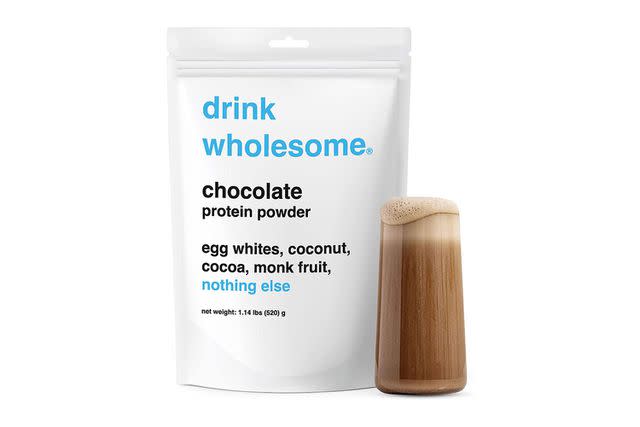
Pros
1-3 grams of sugar per serving
Minimal ingredients with no fillers or artificial ingredients
No sugar alcohols or stevia
Dairy-free
Cons
Not suitable for those with egg allergies
Though not designed specifically for kids, Drink Wholesome makes our list for its quality ingredients, production practices, flexible dosing, and kid-friendly flavors. A bonus is that because it’s made with real food (the protein comes from dried and powdered egg whites) instead of protein isolates, many find it’s easier to digest than other protein powders.
With only four ingredients and no added sugar, Drink Wholesome is tasty on its own and also works well added to smoothies, oatmeal, pancakes, or any of your child’s favorite foods. In addition to classic kid flavors like chocolate, peanut butter, and vanilla, there’s also an unflavored variety, which may work best for some picky eaters.
The recommended serving size provides 20 grams of protein which is dosed for adults. We suggest using half of the recommended serving or less, which not only makes it more suitable for kids, but also cuts the cost per serving. Each half serving also only provides 1.5 grams of sugar.
Drink Wholesome is Good Manufacturing Practice Certified, made in a registered FDA facility, and is free of additives, dairy, gluten, and lactose.
Price at time of publication: $40 ($1.43 per ½ serving size)
Key Specs:
Form: powder | Type: egg whites | Protein per serving: 10g | Third-Party Certified: Yes | Servings Per Container: 28 (half serving size for kids)
Related:The 6 Best Pregnancy-Safe Protein Powders
Best Plant-Based Low Sugar: Amazing Grass Kidz Superfood Protein + Probiotics

Pros
USDA Organic
Only 2 grams of added sugar
Contains organic fruit and vegetable blend
Best for kids who just need protein added
Cons
Stevia may not suit all taste preferences
We love that Amazing Grass Kidz Superfood drink mix powder contains ingredients you actually recognize like organic beet juice powder, banana, pineapple, cocoa, has 10 grams of pea protein, and has 1 billion CFU probiotics per serving. This protein powder provides 70 calories (less than other protein powders and shakes), and it is not fortified with vitamins and minerals. So, it’s ideal if protein is your primary goal for a supplement. While some may appreciate the added probiotic, some children may not benefit from the added probiotic if they have underlying gut issues or take other probiotic supplements.
Each serving has only two grams of sugar, but note it does have stevia, which may not suit all taste preferences.
With no artificial colors, flavors or fillers, Kidz Superfood Protein + Probiotics is vegan, dairy-free, and gluten-free. It’s available in chocolate and strawberry and works blended into prepared foods or mixed on its own with non-dairy or regular milk.
Price at time of publication: $27 ($1.80 per serving)
Key Specs:
Form: powder | Type: organic pea protein with probiotics | Protein per serving: 10g | Third-Party Certified: No | Servings Per Container: 15
Related:The 7 Best Supplements for Autistic Kids, According to a Pediatric Dietitian
Best High Protein: Grow Daily 3+ Healthy Heights Protein Powder

Pros
Only 3 grams added sugar
3 flavor options
Fortified with vitamins and minerals
Free from artificial colors and flavorings
Cons
Expensive
Not suitable for milk or dairy sensitivities
Developed by pediatricians and nutritionists, Healthy Heights is more than just a children’s protein powder; it’s a full nutritional supplement that can help support growth in kids ages 3-9. Each serving contains 12 grams of protein, 180 calories, fiber, vitamins and minerals, making it great for kids who have fallen off their growth curves. When added to 1/2 cup of milk, the protein amount goes up to 18 grams per serving.
Note the protein dose is high for young kids, though you can easily halve the dose if desired. This powder is available in a larger pouch or single serving pouches making it convenient to take on-the-go.
Healthy Heights is made from whey-protein and comes in chocolate, vanilla, and plain. You can mix it with water or milk or prepare it in a smoothie or baked goods. Healthy Heights is not third-party tested, but this formula is free of artificial colors, flavors, and doesn’t contain soy, gluten or corn syrup.
Price at time of publication: $25 for 7 individual pouches ($3.57 per serving)
Key Specs:
Form: powder | Type: whey protein | Protein per serving: 14g | Third-Party Certified: No | Servings per container: 7
Related:The 6 Best Electrolytes for Kids Who Are Sick, According to Pediatric Dietitians
Best for Baking: Nutiva Organic Cold-Pressed Raw Hemp Seed Protein Powder
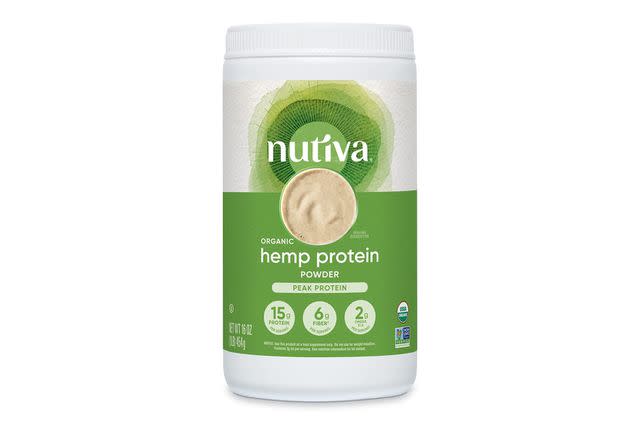
Pros
Third-party tested
Multi-purpose
USDA Organic
Contains just organic hemp seed protein
Cons
Grittier mouthfeel in drinks
Settles when mixed into thin liquids
There are a lot of things we love about Nutiva Hemp: it’s a good source of protein, heart healthy fats, magnesium, iron, potassium, zinc, and fiber. There are no added sweeteners or other ingredients, and it’s a budget-friendly way to incorporate protein into your child’s diet. It is also third-party tested for purity and potency (including heavy metal testing), so you can trust it’s a safe option for your child.
Nutiva Hemp is simply ground organic hempseed. Because it’s not a processed isolate or concentrate, Nutiva Hemp doesn’t blend smoothly into a drink like many other protein powders. It's best when mixed with other foods like smoothies or energy balls or used in baking, which can be great for selective eaters.
The recommended serving size provides 15 grams of protein, so you’ll likely want to cut back if using Nutiva in a smoothie. Otherwise, a full serving incorporated into a batch of granola bars or a loaf of banana bread provides a subtle protein bump without dramatically affecting taste or texture.
Price at time of publication: $18 ($1.20 per serving)
Key Specs:
Form: ground hempseed | Type: hemp | Protein per serving: 15g | Third-Party Certified: Yes | Servings per container: 15
Protein Powders and Shakes We Excluded From Our List
Many popular protein supplements for kids contain high amounts of added sugar or corn syrup, excessive amounts of protein, and added vegetable oils and gums. Because most kids do not need high amounts of protein added to their diets, we aimed to exclude those with excessive amounts. Additionally, we strove to stay away from products with high amounts of added sugar, as most parents already worry about their children eating too much sugar.
Is a Protein Powder or Shake Beneficial?
When kids avoid protein foods or don’t eat enough total calories, it can impact their growth and development. Protein powder may help fill in the gaps and because most protein supplements for kids also include added carbs, fats, and micronutrients, they can ensure a child with low food intake is getting not only the protein they need, but additional calories and nutrients as well.
If your child is a picky eater, has food allergies, has a medical condition impacting their nutritional needs or oral intake, or consumes a vegan diet, they might benefit from supplementing with protein powder to meet their requirements.
Who May Not Benefit From Protein Powders or Shakes
Protein is an essential nutrient for growth and development, but too much protein can be harmful to kids and could potentially lead to dehydration, weight gain, and kidney or liver damage.
However, it’s important to realize that even if it seems like your child is not eating sufficient protein, most healthy kids do get all the protein they need from a balanced diet. According to Natalia Stasenko, MS RD, even most children with feeding difficulties do not need any protein supplements as research shows they manage to get enough protein, even from their limited diet.
Stsenko warns that protein shakes and drinks may result in a more limited diet and less optimal nutrition for some kids, and they should only be used when recommended by a healthcare professional based on a careful assessment. “Very occasionally, when feeding difficulties lead to growth problems, protein supplementation may help close the potential nutritional gap,” she says. She warns against serving them to picky toddlers in particular, as they need little protein to thrive and grow.
How We Select Supplements
Our team works hard to be transparent about why we recommend certain supplements; you can read more about our dietary supplement methodology here.
We support supplements that are evidence-based and rooted in science. We value certain product attributes that we find to be associated with the highest quality products. We prioritize products that are third-party tested and certified by one of three independent, third-party certifiers: USP, NSF, or ConsumerLab.com.
It's important to note that the FDA does not review dietary supplements for safety and effectiveness before they go to market. Our team of experts has created a detailed, science-backed methodology to choose the supplements we recommend.
We also interviewed Natalia Stasenko, MS RD, founder of Easy Bites app for further insights into who may or may not benefit from a protein powder or shake for kids.
What to Look For in Protein Powders and Shakes
Third-Party Testing
Supplements that are third-party tested are sent to a lab where they are tested to ensure they contain what they say they contain and are not contaminated with specific high-risk, common contaminants. However, it’s important to note:
Third-party testing does not test to see if a product is effective or safe for everyone, and it does not ensure the supplement will not interact with other supplements or medications.
Not all third-party testing is created equal. It is not uncommon for supplement companies to pay labs for certificates after conducting minimal to no testing.
The third-party certifications we can trust are ConsumerLab.com, NSF, and USP. However, these certifications are difficult to obtain and/or expensive for manufacturers, so many companies choose not to get their products tested by one of these three organizations.
Sometimes products tested by these three companies are more expensive to try to offset the cost they pay for certification.
Just because a supplement is not tested by one of these three companies, it does not mean it’s a bad product. We recommend doing some research on the reputability of the manufacturer and calling up the manufacturer and their testing lab to determine their protocols and decide if you feel comfortable consuming the supplement.
Form
Since protein is found in a variety of foods, protein powders can be made from a variety of sources. Common protein powder sources for kids are whey, pea, rice, soy, and hemp seed. The protein powders we included are derived from whey, pea, rice, peanuts, and hemp seed.
While all of these protein sources have been evaluated for safety in the general population, at this point, there are no quality studies evaluating the efficacy of one protein over another in children.
Ingredients & Potential Interactions
It is essential to carefully read the ingredient list and nutrition facts panel of a supplement to know which ingredients and how much of each ingredient is included, relative to the recommended daily value of that ingredient. Please bring the supplement label to a healthcare provider to review the different ingredients contained in the supplement and any potential interactions between these ingredients and other supplements and medications you are taking.
Protein Powder and Shakes Dosage
The ingredients, doses, and varieties of protein supplements for kids vary greatly. Many include added micronutrients, and the fat, carbohydrate, and protein amount can vary greatly. Most drinks and powders made specifically for children contain 5-10 grams of protein per serving.
Be sure to read the entire nutrition label when picking a protein powder or shake for your child and consider your child’s overall nutrition needs when making your selection. Remember that you can adjust the dose as needed. Be especially mindful if using a supplement for adults, as many provide 20 grams of protein per serving, which is too much for most children. A dietitian can help best determine what is best for your child’s nutritional needs.
How Much is Too Much?
Protein powders provide a high amount of protein in a small volume, so it’s easy to get too much. This is especially for younger children, who don’t have high protein needs, and most healthy children who eat a well-rounded diet that provides ample protein.
Because many protein supplements for kids include protein, fat, and added vitamins and minerals, you want to take your child’s whole diet and supplement regimen into account. A protein supplement in conjunction with a regular diet and a multivitamin could exceed nutritional requirements.
If you’re curious about how much protein your child is getting from their diet, you can track their usual daily intake and compare it to the Dietary Reference Intakes (DRI) below.
The DRI for daily protein intake are:
1 to 3-year-olds: 13 grams (g)
4 to 8-year-olds: 19 g
9 to 13-year-olds: 34 g
14 to 18-year-old girls: 46 g
14 to 18-year-old boys: 52 g
Frequently Asked Questions
What is the risk of protein supplementation in kids?
According to Stasenko, too much protein creates excessive work for a child's kidneys and liver. Excess protein can also lead to dehydration and constipation. High protein intake in babies and toddlers is also associated with a risk of being overweight later in life.
Protein supplements could also contribute to excessive levels of vitamins and minerals in kids who also take a multivitamin.
What are the symptoms of protein insufficiency or deficiency in kids?
Chronic protein insufficiency is rare. Its signs, however, are fairly general. Stasenko notes an overlap between potential signs of protein deficiency, such as slow growth, poor concentration, and low immunity, and other potential causes, from genetics, inadequate sleep, or high stress.
How do I know if my child needs a protein supplement?
Stasenko recommends speaking to a healthcare professional or dietitian if you suspect they need a protein supplement. They can help you assess your child’s current intake, growth, and nutritional needs.
Are protein powders better than shakes?
If your child needs a protein supplement, the best option is the kind they tolerate and will readily eat or drink. You want the supplement that works for your child and your circumstances. That being said, most prepared shakes have a long ingredient list, contain additives, and have high amounts of added sugars. However, they may be more convenient than mixing a powder.
Why Trust Verywell Family
Jennifer Friedman, MS RD is a registered dietitian and mom of two with a speciality in pediatric nutrition and picky eating. Jennifer is the owner and founder of Jenny Friedman Nutrition, LLC, a private coaching and nutrition practice that supports parents of children with eating difficulties. Jennifer holds a masters of science in nutrition and public health from Columbia University.
Read Next:The 5 Best Iron Supplements for Kids of 2023, According to a Dietitian

